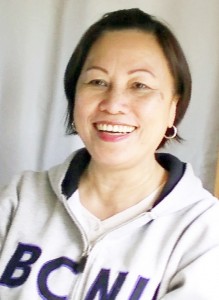Shift work gives time for kids
Name: Delia Magale
Occupation: Gerontological nurse
Union: BCNU
Delia has been a gerontological nurse in BC since 1975, one year after she arrived in Canada. But she arrived at that vocation by a circuitous route.
Young Delia was inspired to study nursing by her aunt who was an operating room (OR) nurse in the Phillipines. When she came to Canada in 1974 and was preparing for her nursing registration exams, Delia imagined herself working as an OR nurse like her aunt. After months of searching for employment at local hospitals which held the promise of being part of a busy surgical team, the only place Delia could find a job was in residential care.
When Shaughnessy Hospital accepted Delia as a grad nurse in its long term care facility, she thought it was just a temporary measure. Delia was surprised that she quickly developed an affinity for gerontology and caring for the elderly.
Delia feels that caring for seniors is “like taking care of my parents back home in the Phillipines.” She goes on to explain that her “compassion was there. Its just like home, when you take care of your parents, your honour your culture.” Thanks to a workplace that offered Delia shifts that allowed her to spend quality time with her family and remain close to her growing children, elder care turned out to be more than a job, it became Delia’s passion.
Now on the cusp of retirement, Delia has great sympathy for the many Internationally Educated Nurses (IENs) who struggle to practice in Canada. She understands that these nurses face many hurdles before being able to nurse here, including numerous assessments and supplementary courses that are required, all of which cost applicants time and money.
The hardest part of qualifying to nurse in Canada for IENs as Delia sees it, is the 250-hour work experience needed before they can work as a registered nurse. Few hospitals are willing to take on IENs so they can fulfill their supervised hour requirements. This means that IENs end up taking whatever position they can get, often in small residential facilities, some despite years of acute nursing experience outside of Canada.
Delia encourages the IENs and student nurses she meets to look to the BC Nurses’ Union for help and advice. “I think every member should be more active within their union,” stated Delia. “That is the only way that we can act as a group to face the government or the employer,” she continued. She urges nurses to “start getting involved with your union. That is where lobbying starts and there is great support. Members should not be afraid to have their say. Its a safe place to open up and talk about our problems. Its the only way to challenge these employers of ours.”
